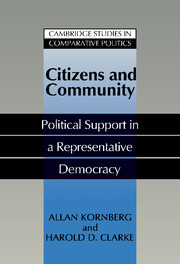3 - Democracy, political system, self
Summary
It is thought that once a society becomes an electoral democracy based on universal suffrage power becomes diffused throughout the general population.
John Porter, The Vertical Mosaic, p. 6Citizens’ beliefs, attitudes and opinions lie at the heart of democratic theory and practice. How people perceive and evaluate the political system and their roles therein affect support for political authorities and the institutions and processes that constitute a democratic political order. In this chapter we will examine a variety of psychological orientations relevant to political support processes in a representative democratic polity. We begin with the concept of democracy itself.
It is reasonable to assume that until the defeat of the Axis powers in World War II, the Cold War and the division of Europe, the end of colonialism, and the emergence of dozens of new states in Asia and Africa that most Canadians would have understood and agreed on what a democratic political order entailed. However, given events since that time - the creation of a number of “peoples’ republics” with command economies, the appropriation of the label “socialist” by communist and other authoritarian political regimes of both the right and left, the increasing emphasis on economic as well as political equality in Western countries and, more recently, the collapse of communism in the Soviet Union, of communist regimes in Eastern Europe, and the economic and political restructuring of those countries - this may be too easy an assumption. As a consequence, we are interested in delineating Canadians views of the meaning of democracy, and the extent to which they believe their country and two premier examples of liberal and nonliberal political systems, the United States and Soviet Union, approximate an ideal democratic polity. We will demonstrate that ordinary citizens, no less than political philosophers, differ in their conceptions of democracy and that some of those differences influence their judgments about the extent to which Canada approximates the democratic ideal.
Political parties are one of the distinguishing features of a democracy, and they play a variety of important roles in the support process by representing public needs and demands and mobilizing citizens to participate politically.
- Type
- Chapter
- Information
- Citizens and Community , pp. 61 - 104Publisher: Cambridge University PressPrint publication year: 1992

